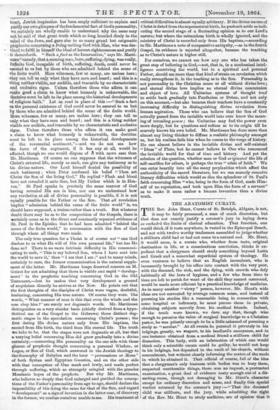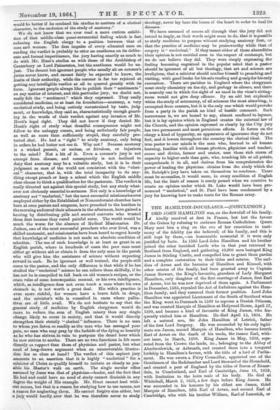• THE ANATOMIST CURATE.
THE Rev. John Hunt, Curate of St. Botolph, Aldgate, is not, it may be fairly presumed, a man of much discretion, but that does not exactly justify a coroner's jury in laying down ex cathedra the limits of clerical education. That function, one would think, if it rests anywhere, is vested in the Episcopal Bench, and not with twelve worthy tradesmen assembled to judge whether a stillborn child had or had not come to a natural end. Mr. Hunt, it would seem, is a curate who, whether from taste, original -destination in life, or a conscientious conviction, thinks it ex- pedient that a clergyman should study something beyond Latin and Greek and a somewhat superficial system of theology. He even ventures to believe that an English incumbent, who is incessantly brought by his office into contact with the very poor, with the diseased, the sick, and the dying, with crowds who defy habitually all the laws of hygiene, and a few who from time to time are left to perish for want of the skill they cannot command, would be made more efficient by a practical knowledge of medicine. As in many another " viewy " person, however, Mr. Hunt's wide ideas are not corrected by average common sense, and instead of pursuing his studies like a reasonable being in connection with some hospital or infirmary, he must pursue them in private, obtaining subjects secretly from his medical friends. Indeed, if the truth were known, we dare say that, though wise enough to perceive the value of surgical knowledge to a Christian pastor, he was priestly enough to be a little ashamed of pursuing a study so "secular." At all events he pursued it privately in his lodgings, greatly, we suspect, to his landlord's annoyance, and in one instance obtained from a medical friend a stillborn child for dissection. This body, with an infatuation of which one would think only a scientific curate could be guilty, he would not keep in his lodgings, but deposited in the vault of his church, without concealment, but without clearly informing the sexton of the mode in which he obtained it. That official of course, full of the idea that a clergyman's only business with bodies was to bury them, suspected unutterable things, there was an inquest, a protracted examination, a great deal of evidence nasty enough out of a dis- secting. room, though not damaging to Mr. Hunt's character except for ordinary discretion and sense, and finally this special verdict returned by the coroner's jury :—" That the deceased child was stillborn, and the jury, while admitting the ryht of the Rev. Mr. Hunt to study medicine, are of opinion that it would ba better if he confined his studies to matters of a clerical character, to the exclusion of the study of anatomy."
We do not know that we ever read a more curious exhibi- tion of that middle-class quasi-reverential feeling which is fast reducing the English clergy to a position between that of men and women. The first impulse of every educated man on reading the verdict is probably to utter an anathema on its delibe- rate and formal impertinence, the jury having exactly as much to do with Mr. Hunt's studies as with those of the Archbishop of Canterbury or Lord Palmerston, but the anathema would be un- just. The decent but ignorant people who usually sit on coroner's juries never know, and cannot fairly be expected to know, the limits of their authority, while the coroner is far too rejoiced at getting any intelligible verdict at all to quarrel greatly with its form. Ignorant people always like to publish their " sentiments " on any matter of interest, and this particular jury, we doubt not, really felt the " sentiment " which they expressed. They really considered medicine, or at least its foundation—anatomy, a very =clerical study, and being entirely unrestrained by taste, judg- ment, or knowledge, they said so, characteristically enough guard- ing in the words of their verdict against any invasion of Mr. Hunt's legal right. They did not know if they denied Mr. Hunt's right of study what dreadful consequences might not follow to the unhappy curate, and being sufficiently fair people, as well as more than sufficiently stupid, they carefully pro- tected that. He had a " right " to study anatomy, only being in orders he had better not use it. Why not ? Because anatomy is a wicked pursuit, or useless, or frivolous, or injurious -to the mind? Not a bit of it. Even a coroner's jury is not exempt from disease, and consequently is not inclined to deny that anatomy may be a valuable study, but it is in their judgment as men of the world not consistent with the "
-cal " character, that is, with the total incapacity to do any- thing except preach or keep a school which the English middle
class choose to think a qualification for the pastorate. The verdict is really directed not against this special study, but any study what-
ever not obviously essential to sermons. Not only is a knowledge of .anatomy not " unclerical," but the most successful missionaries ever employed either by the Established or Nonconformist churches have been at once pastors and surgeons, have preached to the heathen in the morning endeared their ailments in the afternoon, have gained a hearing by distributing pills and secured converts who trusted them first because they cured painful sores. The world would be much the worse for the absence of Medical Missionaries. Dr. Judson, one of the most successful preachers who ever lived, was a skilled anatomist, and missionaries have been heard to regret keenly that knowledge of medicine is not made an absolute condition of selection. The use of such knowledge is at least as great in an English parish, where in hundreds of cases the poor man must either go without aid or obtain it from the only man in the parish who will give him the assistance of science without expecting reward in cash. Be he ignorant or well trained, the people still -come to the pastor, and the only difference is that while if he has studied the " =clerical " science he can relieve them skilfully, if he has not he is compelled to fall back on old women's recipes, or the cram rules of some homceopathic manual, or his own intelligence, which, as intelligence does not even teach a man where his own stomach is, is not worth a great deal. His wife's practice is even more riskful, for women have a brave faith in drugs, and the minister's wife is consulted in cases where pallia- tives are of little avail. We do not hesitate to say that the general study of medicine by English clergymen would do more to reduce the sum of English misery than any single change likely to occur in society, and that it would directly strengthen their strictly "clerical" influence. There is no man to whom you listen so readily as the man who has assuaged your pain, no man who may pray by the bedside of the dying so heartily as he who has striven in vain to postpone the dread hour which he now strives to soothe. There are no two functions in life more directly en rapport than those of physician and pastor, but what need of long-drawn argument when an unanswerable illustra- tion lies so close at hand? The verdict of this sapient jury amounts to an assertion that it is highly " unclerical " for a minister of Christ to qualify himself to imitate as closely as pos- aible his Master's walk on earth. The single secular office assumed by Jesus was that of physician—healer, and the fact that He had and could have no need of study cannot diminish in any degree the weight of His example. Mr. Hunt cannot heal with- out means, but that is a reason for studying how to use means, not a reason for neglecting them. He cannot forgive sins either, but a jury would hardly aver that he was therefore never to study theology, never lay bare the bones of the heart in order to heal its diseases.
We have assumed of course all through that the jury did not intend to imply, as their words might seem to do, that it is possible to study medicine to purpose without studying anatomy first, or that the practice of medicine may be praiseworthy while that of surgery is unclerical." If they meant either of those absurdities their opinion is not entitled even to the respect of contempt, but we do not believe they did. They were simply expressing the feeling becoming engrained in the popular mind that a pastor should be ignorant of all but theology, that art and science are irreligious, that a minister should confine himself to preaching and visiting, with good books for his sole reading and gossip for his only recreation. There are parishes in England where the clergyman must study chemistry on the sly, and geology in silence, and there is scarcely one in which the sight of an easel in the vicar's sitting. room would not give deep offence. By an odd but explicable whim the study of astronomy, of all sciences the most absorbing, is exempted from ceasure, but it is the only one which would provoke from a party in the parish no kind of hostile comment. Such narrowness is, we are bound to say, almost confined to laymen, but it is lay opinion which in England creates the external law of the Church, and the opinion expressed so clearly by the City jury has two permanent and most pernicious effects. It forces on the clergy a kind of hypocrisy, an appearance of ignorance they do not feel, and it lowers throughout the country the clerical ideal. The true pastor to our minds is the man who, learned in all human learning, familiar with all human practice, physician and teacher, savan and divine, farmer and orator, uses those rich stores of capacity to higher ends than gain, who, touching life at all points, comprehends it in au, and derives from his comprehension the power of healing the physician obtains from the study which the St. Botolph's jury have taken on themselves to condemn. There must be anomalies, it would seem, in every condition of English life, but the limit of reason is surely passed when we contrive to create an opinion under which St. Luke would have been pro- nounced "=clerical," and St. Paul have been condemned by a jury for knowing how to make tents for the Roman army.































 Previous page
Previous page